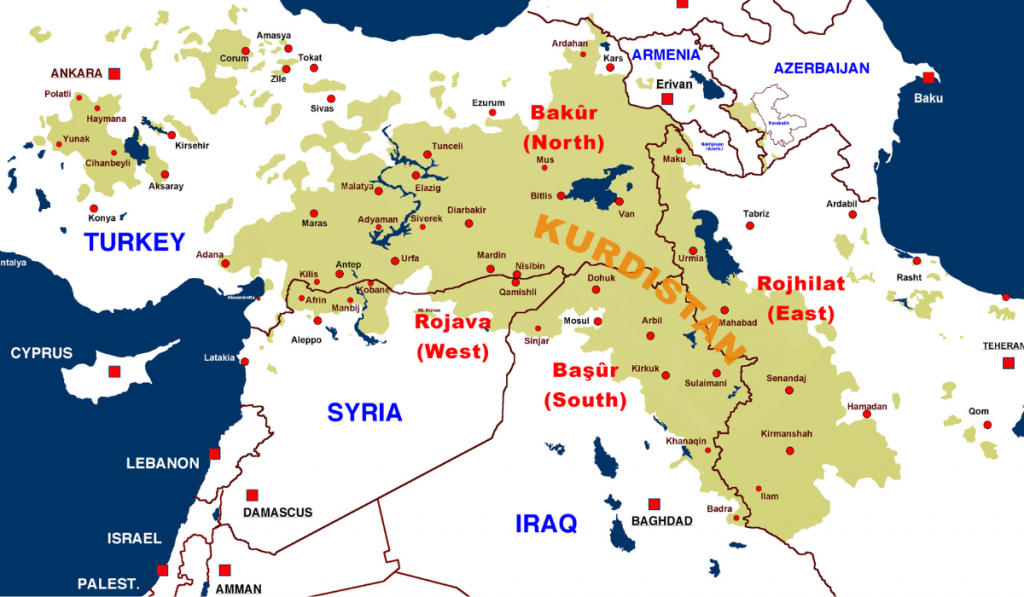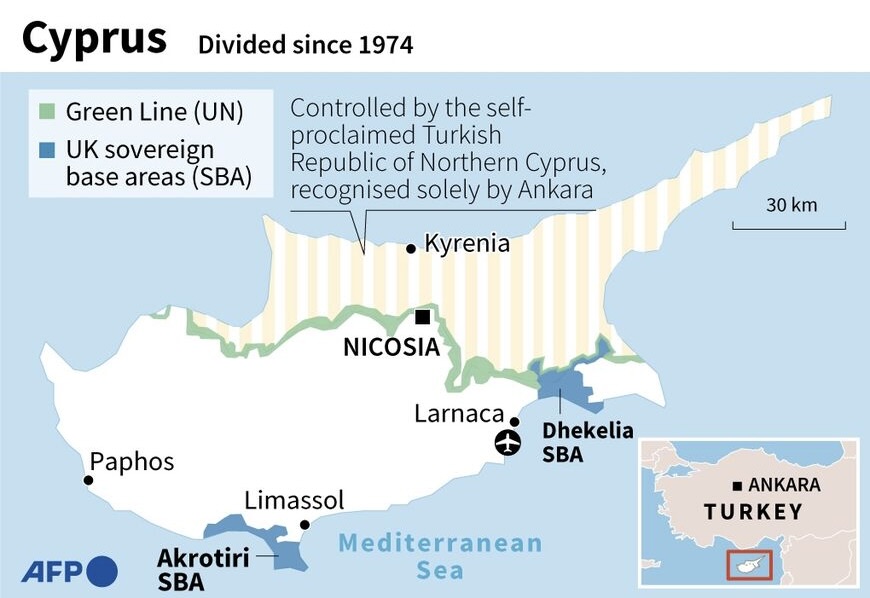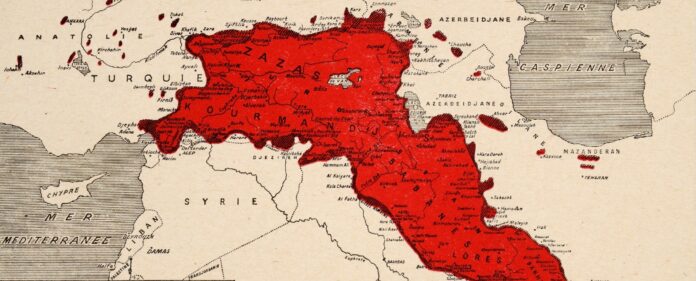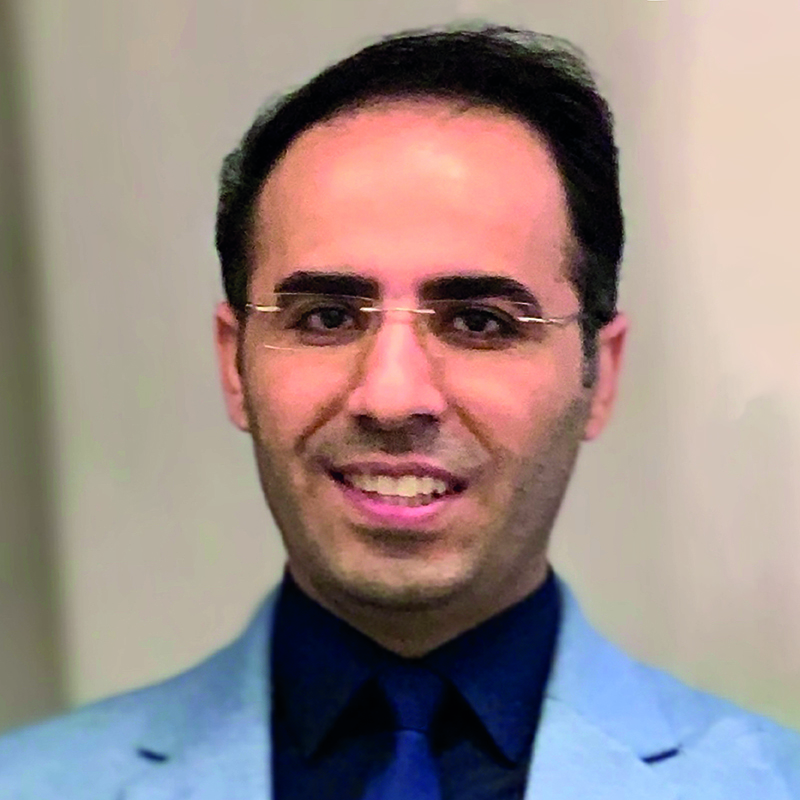The past decade has seen relentless Turkish expansion into Kurdistan. This encroachment has disturbing echoes of Turkey’s 1974 invasion of Northern Cyprus — a violation largely ignored by the rest of the world. It is crucial, Loqman Radpey warns, that the international community does not abandon the Kurds in their fight against Turkey’s violations.
Author
Loqman Radpey
The historical division of Kurdistan
The 1923 Treaty of Lausanne thwarted the establishment of a sovereign Kurdistan state. As a result, the Kurdish nation were dispersed into Iran, Iraq, Syria, Turkey, and the Soviet Union. In 1930, Stalin’s regime dissolved Red Kurdistan (Krasnyi Kurdistan) and integrated it into Azerbaijan. Forced Kurdish deportations to other Soviet republics exacerbated the fragmentation of Kurdistan yet further, leaving the region divided among only four states. Today, Western and Southern Kurdistan are suffering the effects of almost a decade of Turkey’s expansionist policies.
Western Kurdistan: ethnic reconfiguration
Ethnic reconfiguration has been unfolding relentlessly in parts of Western Kurdistan (in Syria) since Turkey’s 2018 occupation. Turkey has systematically engaged in ethnic cleansing of Kurds. It has orchestrated demographic changes by settling thousands of non-Kurds, including Arab Palestinians, in the occupied areas. These policies, coupled with frequent abductions of Kurds, have been enforced in Turkish-controlled Efrîn, Serê Kaniyê, Tell Halaf, Girê Spî, and other regions.
Qatar, Kuwait, and Pakistan have been complicit in this ethnic cleansing by establishing residential settlements, brazenly flouting international law and bolstering Turkey’s aggressive agenda. Turkey has also perpetrated heinous environmental violations in Kurdistan, including the felling of ancient olive groves and forests.
Turkish state symbols now appear prominently in public spaces in Kurdistan
Since 2018, Turkish-occupied districts have been under the direct administration of Turkish governors. Turkey swiftly installed public schools with Turkish Ministry of Education-approved curricula, set up branches of the Turkish postal service, and opened a new regional campus of Turkey’s Gaziantep University. Turkish state symbols now appear prominently in public spaces.

Source Towards an Independent Kurdistan: Self-Determination in International Law
Southern Kurdistan: Turkey’s military presence
The population manipulation scenario also looms over Southern Kurdistan.
The Treaty of Angora, signed on 5 June 1926, integrated Southern Kurdistan into Iraq, aligning with Britain’s strategic interests. For decades afterwards, the Kurds endured oppression, genocide, chemical attacks, and suppression by the Iraqi regime. However, they found relief with the establishment of a no-fly zone in 1991, shielding them from Ba‘athist brutality. Iraq’s constitution, ratified in October 2005, recognised the autonomous Kurdistan Regional Government (KRG).
Following the breakdown of peace negotiations between Turkey and the Kurdistan Workers’ Party (Partiya krêkaren Kurdistanê or PKK) in February 2015 and the subsequent flattening of Nisêbîn, Mêrdîn, Cizîr, Silopî, Sur, and Gever in Northern Kurdistan, Turkey extended its military presence. Turkey established numerous bases more than 35km deep into Southern Kurdistan, ostensibly to combat PKK guerrillas.
Hundreds of Turkish-trained ex-ISIS jihadists have been smuggled into the KRG, undetectable in their Turkish army uniforms
Using drone technology, Turkey’s military reach into the South has at times exceeded 290km, with over 15,000 soldiers, tank deployments, and the recent setup of checkpoints. Hundreds of Turkish-trained ex-ISIS jihadists have been smuggled into the KRG, undetectable in their Turkish army uniforms.
The plight of Kurdish citizens
With approval from the Iraqi government and tacit silence from the KRG, Turkish forces are now coercing Kurdish villagers to evacuate their homes. Over the past decade, continuous Turkish incursions have razed hundreds of Kurdish villages and caused the killing and displacement of numerous Kurdish civilians, including refugees from the UN-registered Maxmur camp. Additionally, Turkish bombings have scorched thousands of acres of farmland. Such acts blatantly violate the principle of self-determination and represent a clear case of foreign subjugation and occupation through coercive measures against the local populace.
Over the past decade, continuous Turkish incursions have razed hundreds of Kurdish villages and caused the killing and displacement of numerous Kurdish civilians
Clearly, the sovereignty of the externally created states of Iraq and Syria is not equal to that of other members of the international community. Turkey and Iran’s consistent violation of this fundamental principle in recent years underscores this glaring reality. Given Iraq and Syria’s precarious statehood, Turkey’s strategy of encroachment poses a significant threat.
Echoes of Northern Cyprus 50 years ago
This scenario is not unprecedented; it echoes the events of half a century ago. On 20 July 1974, following a Greek military junta-supported coup, Turkey invaded the northern part of Cyprus. The Greek population was expelled from the region, and Turks from the predominantly Greek south relocated to the north. In 1983, the northern part of Cyprus, administered by Turkish Cypriots, declared itself the Turkish Republic of Northern Cyprus (TRNC). It has only ever been recognised by Turkey which, along with its military presence, effectively runs the government.

Turkey’s actions stood in flagrant violation of international law, specifically the prohibition on the use of force, rendering the creation of TRNC illegal. Since then, Cyprus has seen a continuous influx of Turkish nationals. Conversely, the indigenous Turkish Cypriot population has dwindled to the point that settlers now outnumber native Turkish Cypriots. The result is a dramatic reshaping of the island’s demographic landscape.
The unsettling echoes of Turkey’s illegal aggression is now resonating in the South and West of Kurdistan, raising the possibility of another enduring occupation scenario.
Global silence on Turkification
Other states and international actors have absolved themselves of any moral or legal obligation to end the occupation of northern Cyprus. In the same way, they remain largely passive in their approach to Kurdistan. Disturbing reports in 2022 on Turkey’s use of banned chemical weapons against Kurdish forces were met with resounding silence. Over the decades, the US, the EU, NATO and Arab League, have made little to no effort to confront Turkey’s actions. They are effectively shielding Turkey from accountability for violating international law and humanitarian law, and for committing war crimes.
The international community’s dismissive stance sets dangerous precedents which carry profound geopolitical implications. Turkey has demonstrated its resolve to maintain control once settled in a territory. At this critical juncture, to safeguard the Kurdish people’s right to self-determination, Turkey must reverse its unlawful actions.
History reveals that the Kurds — with no standing in international relations — remain the sole primary opposition to Turkey’s occupation and annexation of Kurdistan.






Αυτό το άρθρο υπογραμμίζει το εξαιρετικά περίπλοκο και σημαντικό ζήτημα του εκτουρκισμού του Κουρδιστάν, το οποίο βρίσκεται σε εξέλιξη εδώ και δεκαετίες. Αυτό είναι ένα σαφές παράδειγμα του τρόπου με τον οποίο ο πολιτισμός, η γλώσσα και η ταυτότητα μιας εθνικής ομάδας μπορεί να απειληθεί από τις πολιτικές αναγκαστικής αφομοίωσης. Δυστυχώς, η διεθνής κοινότητα συχνά απλώς «παρακολουθεί» χωρίς να αναλαμβάνει πραγματική δράση για την προστασία των πολιτιστικών δικαιωμάτων και της διαφορετικότητας. Είναι σημαντικό να συνεχίσουμε να συζητάμε αυτό το θέμα και να παροτρύνουμε την παγκόσμια κοινότητα να διαδραματίσει ενεργό ρόλο στην προστασία των δικαιωμάτων των ευάλωτων μειονοτήτων. Επισκεφθείτε τον ιστότοπό μας Telkom University Jakarta
“Δυστυχώς, η διεθνής κοινότητα συχνά απλώς «παρακολουθεί» χωρίς να αναλαμβάνει πραγματική δράση για την προστασία των πολιτιστικών δικαιωμάτων και της διαφορετικότητας”
Ποια είναι η “διεθνής κοινότητα”; Ο όρος είναι εντελώς ασαφής. Αυτό που επιχειρείται από την ΝΤΠ, εργαλείο τής οποίας είναι και η ΕΕ, είναι η απάλειψη των εθνικών ταυτοτήτων και ιδιαιτεροτήτων, γι αυτό υποστηρίζω ότι τα εθνικά κράτη δεν πρέπει να εκλείψουν ποτέ.